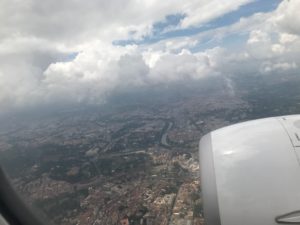I was travelling today, so I did not fast. I considered fasting anyway, because I wanted to be part of the community, at least virtually – my Whatsapp right now is a constant scroll of friends and family checking in with each other, asking what everyone is having for iftar, sending both cheesy and/or moving duas and Ramadan memes and photos of adorable babies and also of their amazing iftars-in-progress, and always, always, complaining about the humidity and the heat and not having had enough time during suhoor to do more than gulp their glass of water.
I send them a photo from the plane as we descend, the clouds drifting over an unfamiliar city that I will explore over the next week, and realize, just after I have sent it, that the photo seems out of place in their context. Later, I walk through the streets around the hotel, familiarizing myself with the route to the university where the conference I am attending will be happening tomorrow.
Relaxed groups of friends and family are sitting outside restaurants under white canopies strung with fairy lights. It is Maghrib time. I go into a cosy-looking café, sending my own photos of Instagramable plates to the people who would be breaking their fast right around now.
Usually, around this time, I would be in a warm crowded kitchen with people coming in every few minutes, consulting the maghrib times attached to the fridge door, giving everyone a running count down: “ten more minutes, five more minutes. Are you ready to pray?” There would be irritable squabbling or irrepressible laughter, or both, depending on the day and the mood. There would be the sweetness of syrup-drenched qatayef and coffee for after the iftar and mhallabiya glass bowls lining the fridge shelf already prepared for suhoor. There would be people wandering in and out of the kitchen, lingering appreciatively over the food after a long day of fasting. There would be hustle and bustle and that pervasive specific indescribable Ramadan-feeling. The television would be turned to an Arabic channel specifically for the MBC Ramadan-themed breaks, even more than for the TV shows: we’ve all somehow become nostalgically attached to the jingles that have replaced the adhan as the soundtrack to our exilic Ramadans.
This time it is different: I recently moved and am still a newcomer in a city where I don’t really know anyone. I am several hours flight away from my family – and right now, I am not even in my own place, but in a small hotel otherwise inhabited only by tourists, working on the last draft of my paper for this conference. I have three looming deadlines to meet this month, one after the other in too rapid succession, because as I am growing to realize, I have a serious problem setting myself up for failure by expecting the impossible. I am stressed about my work, annoyed at myself for taking in more than I can handle, and guilty, as ever, about not doing more to have “a proper Ramadan,” whatever that magical mythical unachievable thing might be.
I’ve written a Ramadan post for MMW almost every year since 2012. Looking back on the old posts now, I can see the trajectory that took me to where I am. In the first post, that is now six (six!) years old, I wrote about how my nostalgic attachment to Ramadan, one of the few constants of my nomadic childhood, has shaped how I still feel about the fast. In 2013, I was clearly having the post-“Arab Spring” blues, but still feeling that I needed to do more with my Ramadan than make resolutions I knew I wouldn’t keep. And by 2015, I was already writing about how I wanted to reclaim Ramadan for myself, stepping back from the idea that the only valid iftar is the one where a large cheerful family gathers around one table – I don’t think those endlessly cheerful family iftar tables really exist anywhere outside of MBC jingles. Finally, the year I completed my thesis, 2016, was in many ways similar to my current mode: one of those “I don’t have time to do the festive thing right now” Ramadans. Except back then, I still had some community, some family around me. This year, I am the one responsible for this Ramadan: it is entirely mine to do what I want with it. And that is both liberating and just a little terrifying.
Since I moved away, I have been thinking through what my religion means to me, trying to untangle faith from upbringing and all the very ordinary and very complex problems that real families have and that have shaped me indelibly. Once or twice, I’ve wondered if anything makes me Muslim other than being seen to be Muslim by others – and now that I no longer wear the hijab I wore for over twenty years, I am not immediately cast as Muslim in the same way. But this has always been my problem with the appearance-is-everything adherents who measure faith based on the outward indicators. Islam is still the faith framework that speaks to me, that makes sense to me. I don’t want it to be reduced to the lapsed inherited traditions I have set aside, nor do I want to keep trying and failing to mimic those traditions in some desperate bid to keep “identity” from slipping away. I hope that I can be satisfied with what I have instead: a blending of the nostalgic and the pragmatic, the traditional and the unconventional, that works for me, at this exact moment I happen to be in right now.
When I return, this is how my iftar will go: my phone will ping to tell me its maghrib time. I will leave my station at the computer and eat my three dates, then drink a glass of milk or qamareldin. I will try to pray alone in a quiet room, the noise of the London traffic muffled behind the drawn curtains, trying to concentrate on something other than work. I will go back into the living room, turn off the computer and turn on the TV to have some background noise while I make a quick meal or eat the leftovers from earlier iftars. And then I will return to work.
This is not anything like all the iftars that have come before, but unfestive as it may be, boring as it may sound, it will still be meaningful to me, my way of keeping a pragmatic Ramadan.



